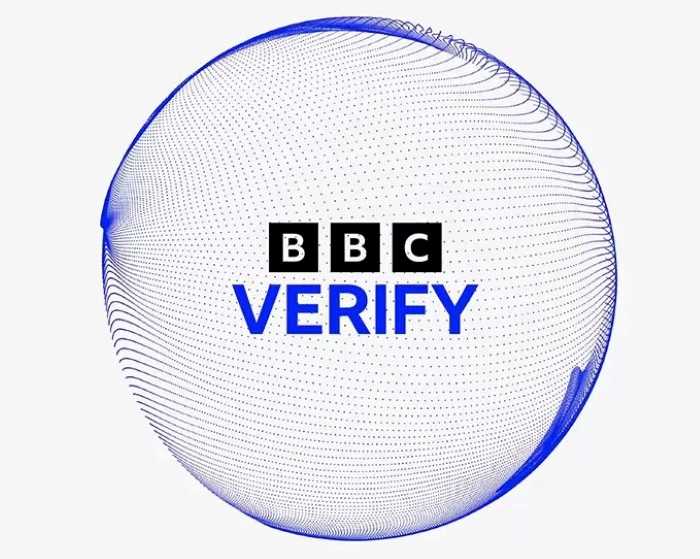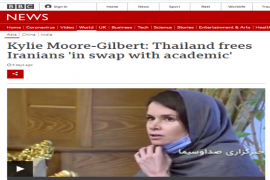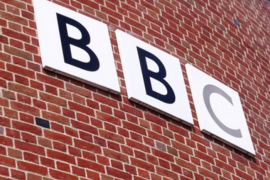In October 2023 the BBC News website published several items of content produced by the BBC Verify team pertaining to the explosion at al Ahli hospital in the Gaza Strip on October 17th.
REVIEWING BBC VERIFY REPORTING ON THE AL AHLI HOSPITAL INCIDENT
The third of those items – published on October 26th – purported to examine the incident (which had already been shown to be caused by rockets fired by the Palestinian Islamic Jihad, as later confirmed by a spokesman from that organisation) in light of “new analysis”. BBC audiences were told that: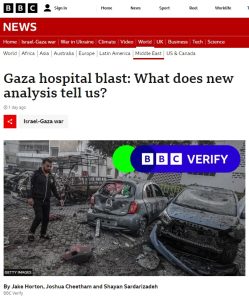
“The Forensic Architecture agency, a UK-based organisation which investigates human rights abuses, has carried out its own analysis of the crater, and suggests it is more consistent with the impact marks from an artillery shell which it concludes came from the direction of Israel.
It says that the scarring patterns above the crater are consistent with the shrapnel damage that would be expected from an artillery strike.” [emphasis added]
As was noted here at the time:
“…BBC Verify chose to amplify – and link to – statements from the political NGO ‘Forensic Architecture’ without clarification of that organisation’s record on Israel and without mentioning the fact that its ‘analysis’ was conducted together with another political NGO – Al Haq – which is linked to a terrorist organisation and hence designated by Israel.”
As we documented in April:
“Nineteen days after the publication of BBC Verify’s report, Forensic Architecture admitted that an image it had used to support its claims concerning “an artillery shell” actually showed rocket impact.
On January 9th CAMERA UK submitted a complaint to the BBC citing that new information and asking why the BBC Verify report had not been amended to reflect it. While we never received a response to our complaint, on January 10th the BBC added a footnote to that report.”

On July 25th 2024 – over six months after the submission of that complaint – we finally received the first communication from BBC Complaints (besides the initial confirmation of its receipt) on that matter. The BBC’s email told us:
“We wanted to let you know that we have referred your complaint to the relevant people and are still looking into it. We regret that it may take a little bit longer before we can reply. Please wait to hear from us before you contact us any further – we appreciate your patience.
Although we reply to most complaints within 2 weeks we cannot achieve this every time. It depends on what your complaint was about and how many others we are handling, or may sometimes be due to issues outside of our control. Sometimes it can take a while to hear back from the key people involved, but we often find the wait is worth it.
Please don’t reply to this email because it’s sent from an account which can’t receive replies.”
On the same day – and at exactly the same time – BBC Complaints sent us an additional email stating:
“We are writing to say sorry that we’ve not been able to reply to your complaint within the time period we aim for. We manage this for most complaints, but it’s not always possible – we apologise that it’s now overdue.
We will respond as soon as we can – we appreciate your understanding.”
Not only did the BBC not acknowledge the addition of that footnote one day after our complaint was submitted but it also completely failed to address the part of that complaint relating to the issue of the article’s non-compliance with BBC editorial guidelines on impartiality concerning “contributors’ affiliations”.
As we noted in our complaint:
“The use of the term ‘IOF’ – i.e. ‘Israel Occupation Forces’: a term only used by anti-Israel activists – in the Forensic Architecture tweet promoted in the [BBC Verify] report, together with the declaration [we] “reaffirm our solidarity with Palestinian people under attack”, should have been enough evidence of the partiality of that organisation for BBC Verify to refrain from amplifying its ‘analysis’.
If BBC Verify cannot even do the basic required background research on the sources it quotes and promotes and their records of political activism, then clearly its declared purpose of countering disinformation does not serve the interests of BBC audiences.”
The BBC Verify article promoting the inaccurate Forensic Architecture claim that the explosion at the al Ahli hospital was caused by a projectile which “came from the direction of Israel” – along with the baseless claim from another dubious source that it was caused by “an Iron Dome interception” – remains online.
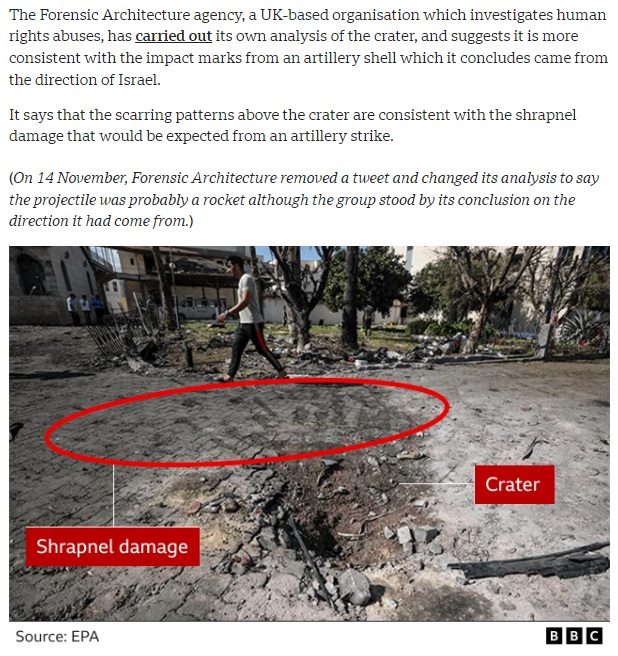
As we see once again, the BBC Complaints system – which should theoretically help reduce the amount of disinformation appearing on BBC websites as “permanent public record” – does not function in a timely or effective manner.
Over twenty years ago the BBC rushed to tell its audiences about a ‘massacre’ in Jenin which never happened. That disinformation remains online to this day with nothing to inform members of the public that claims amplified in a multitude of reports were groundless.
Coverage of the al Ahli hospital explosion – including by the ‘fact checking’ department BBC Verify – has become yet another chapter in the saga of the BBC’s failure to address the very serious issue of its own promotion – including in the future – of disinformation sourced from dubious and politically motivated actors.
Related Articles:
RETURNING TO BBC COVERAGE OF THE AL AHLI HOSPITAL EXPLOSION
BBC UNABLE TO REPLY TO A COMPLAINT ABOUT ITEMS IT ALREADY AMENDED

